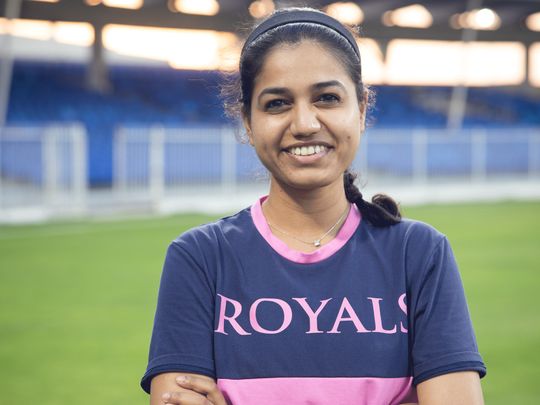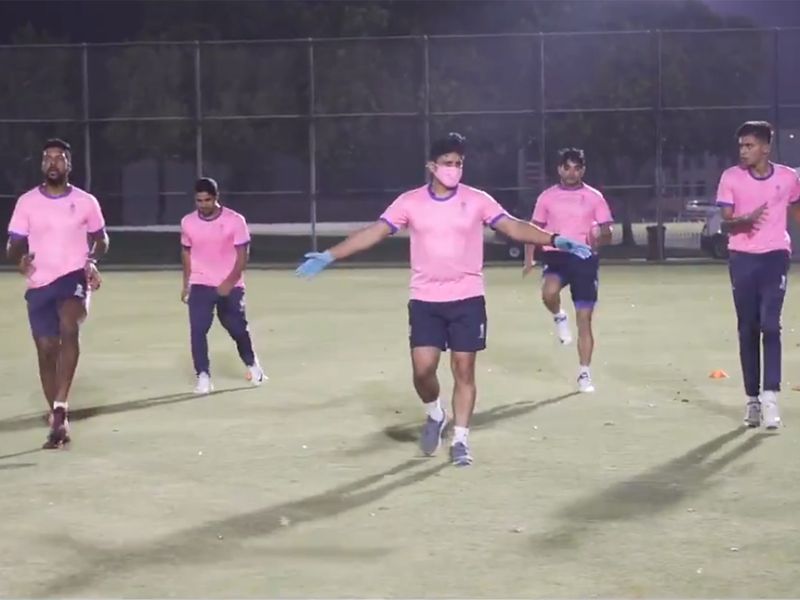IPL 2020 in UAE: Meet Anuja Dalvi, the only female physio in world’s richest T20 league
[ad_1]

Image Credit: Supplied photo
Dubai: The smiling visage of Anuja Dalvi at the practice sessions of Rajasthan Royals – ever since their Indian players got down to business from the last week of August in Dubai – did not really raise an eyebrow. Yes, she is the only female physio in the Indian Premier League (IPL), who is also doubling up as their in-charge of the COVID-19 task force, but she had already carved a niche for herself in this field in India before taking up the assignment.
In an arena which is dominated by some of the biggest names in the business like her mentor John Gloster, former Indian physios Andrew Leipus or Shankar Basu, Anuja is the stereotype of what you call the barrier-breaker – but has serious credentials to back it up. A Masters degree holder of Musculoskeletal & Sports Physiotherapy from the University of South Australia, Anuja had been trained at two elite institutes; GS medical college at KEM Hospital in Mumbai and her Alma Mater at Adelaide.
Backed by over 11 years of experience, during which she has worked as the National Cricket Academy of the BCCI in Bengaluru as well as the Bangladesh Cricket Board (BCB), Anuja admits the current assignment is certainly one of the most demanding ones in her career.
Just as the Royals were about to leave for the UAE around the third week of August, they had a bit of hiccup when their fielding coach Dishant Yagnik tested positive for coronavirus. How difficult was it to leave him back in India and monitor his progress? ‘‘John (Gloster) and I were in constant touch with Dishant – not just over his physical health but we supported him to stay motivated throughout. We made sure that the protocols were followed without losing the human touch and taking care of the sensitivity of the situation. Dishant was patient and cooperative throughout this process. It was wonderful to have him back in business here by early September,’’ Anuja recalled.
Speaking to Gulf News in an exclusive chat, 34-year-old Anuja, wife of Niranjan Pandit – a familiar name in the scene of sports medicine in India – admitted that it’s been a learning process to combine the two roles of being a team physio and in-charge of Covid task force for a high profile sports franchise like Rajasthan Royals. ‘‘It’s been a very interesting journey so far in my First year with Royals. I have previously done medical management work with IMG-IPL and Pro Kabbadi League but in these unique circumstances of Covid -19, each moment is a learning experience.

Image Credit: Supplied picture
‘‘I am largely handling the Covid management for our franchise with an invaluable support of my team members, most notably team doctor Dr Robert Young and Gloster. A lot of structured thinking has gone behind our bio-bubble and the higher management is paying particular attention in achieving the very best to formulate and implement protocols – and at the same time – taking care of nurturing a healthy team environment in the bubble,’’ Anuja said.
During the course of the interview, Anuja admits that she has had to handle the question of being a barrier-breaker only in media interviews. ‘‘Honestly, only if someone points out this fact that I’m the only female in the core support staff team is when I realise the gender-difference. Someone told me sometime back that gender doesn’t matter, what matters is the work should be accomplished with the highest quality – and I believe in this thought completely. In the past, I have worked with various elite male athletes at my clinic as well as on the field. I knew some of the boys from before and having worked in cricket for a decade makes the scenario much easier. I must appreciate the professionalism of all our boys, there is not a small percentage of awkwardness. The work environment is extremely encouraging,’’ she observed.
An unique feature of Anuja’s profile is that she seems to have her either feet in cricket and Olympic sports – having worked with the International Table Tennis Federation (ITTF), badminton, tennis, shooting and gymnastics. She is also a part of a NGO Go Sports Foundation which works with the Olympic and Para-olympic athletes.
How different are the nature of fitness issues and injuries on the two sides? Taking off on the technical perspective, she says: ‘‘There is this common notion around cricket that it doesn’t require athleticism and fitness like other olympic sports. Well, I have been fortunate to have worked closely with different sports and the sports science & injury analysis of each sport is non-comparable.
‘‘Traditionally, a sport of skills, cricket is drastically embracing the fitness and athleticism especially with the growing popularity of T-20. Olympic sports have always demanded the extreme prowess out of an athlete especially as most of them are individual sports. Also the psychology and sports science behind team sports and individual sports will always remain uniquely different,’’ she felt.
Finally, did she ever feel the shadow of gender bias in executing her job in a career spanning over a decade? ‘‘I have been working in the professional sports sector for a decade now but fortunately, I have never encountered any gender bias. I was recommended By Mumbai Cricket Association (MCA) over my male physio colleagues for the NCA cricket-specific certification in the year 2009 – the year when my cricket journey started. I was one of the brightest in my class of Level 1 Physiotherapy and have been always respected and appreciated by my male colleagues in cricket.
‘‘I feel in our world of Sports Physio & Sports sciences, there shouldn’t be any gender bias. Females are equally talented as males. Your skills & technique as a physio and the willingness to put in hard work can make you equally effective in the hands-on treatment. But the most important thing is you have to follow the ethics, develop the right attitude and professionalism. This is the key to success in any field for any gender,’’ she signed off.
[ad_2]
Source link

